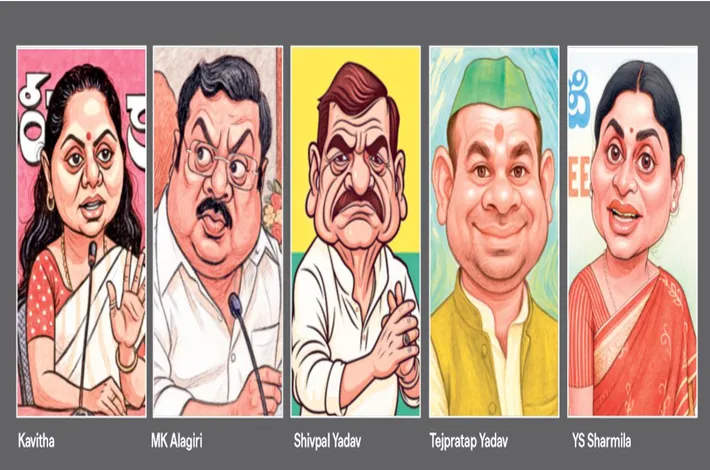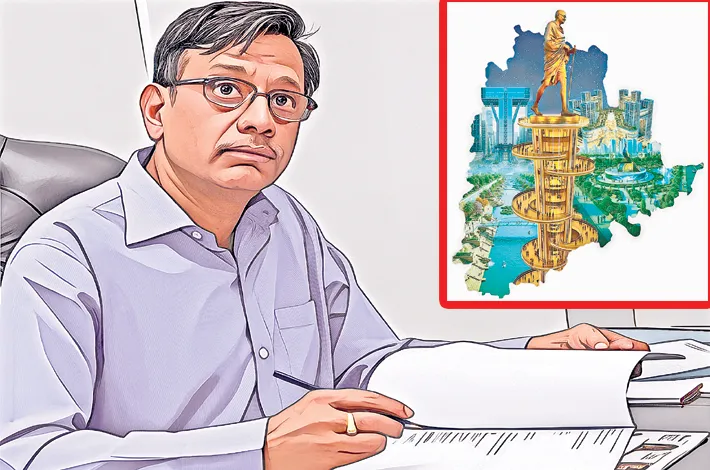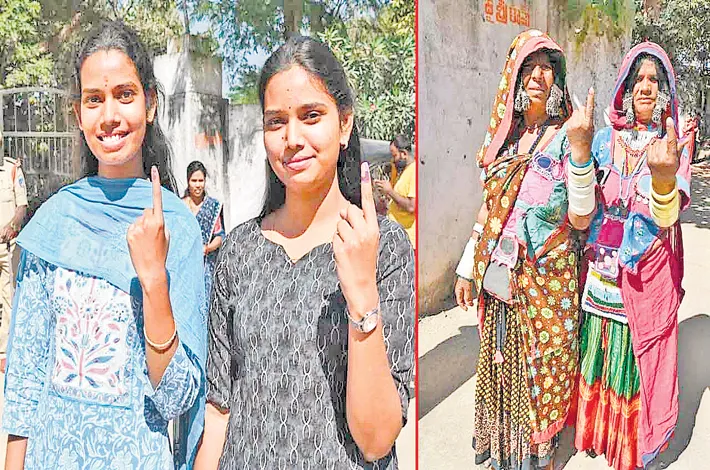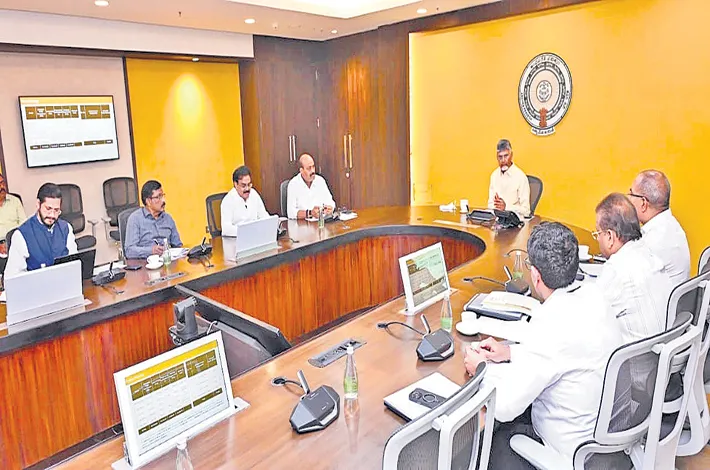Father’s Agony Kids Return Gift
04-09-2025 12:00:00 AM

Kavitha’s exit and the perils of family politics in India’s regional parties
vjm divakar I hyderabad
The Bharat Rashtra Samithi (BRS), once a formidable force in Telangana politics, is reeling from a seismic family feud that has exposed deep fissures within its ranks and highlighted the vulnerabilities of regional parties built on personality cults. On Wednesday Kavitha, daughter of BRS founder and former Telangana Chief Minister K Chandrasekhar Rao (KCR), resigned from her position as a Member of the Legislative Council (MLC) and her primary membership in the party, a day after being suspended by her father for "anti-party activities." Her dramatic exit, marked by scathing accusations against her cousin T Harish Rao and former MP J. Santosh Rao, has sent shockwaves through Telangana’s political landscape, raising questions about the sustainability of dynastic politics in India’s regional parties.
Kavitha’s resignation followed a public outburst where she accused Harish Rao, a former Irrigation Minister, and Santosh Rao of orchestrating a conspiracy to tarnish KCR’s image in the Kaleshwaram Lift Irrigation Project (KLIP) scandal. She alleged that the duo, in collusion with Telangana’s current Chief Minister A. Revanth Reddy of the Congress, amassed ill-gotten wealth while making KCR the scapegoat for the alleged irregularities. Her remarks came on the heels of the Congress government’s decision to hand over the Kaleshwaram probe to the Central Bureau of Investigation (CBI), following the Justice P.C. Ghose Commission’s report that implicated KCR, Harish Rao, and others. Kavitha’s defense of her father was fierce, claiming he would emerge "as pure as a pearl" from the inquiry, but her attack on family members and party stalwarts crossed a line, prompting KCR to suspend her—a move that has deepened the rift within the Kalvakuntla family.
This episode is not just a personal tragedy for KCR, who at 71 is grappling with both familial betrayal and political decline, but also a stark reminder of the fragility of regional parties anchored by a single towering figure. Kavitha, her brother K.T. Rama Rao (KTR), and Harish Rao have all benefited immensely from their proximity to KCR during his decade-long reign as Telangana’s Chief Minister (2014–2023).
Kavitha, who founded Telangana Jagruthi to promote the state’s cultural identity, was elected as an MP from Nizamabad in 2014 and later as an MLC. KTR, the BRS working president, held key portfolios like IT and Municipal Administration, while Harish Rao, KCR’s nephew, managed critical sectors like Irrigation and Finance. Together, they formed a powerful troika that ran a parallel administration, but their proximity to power also bred rivalries and ambitions that are now tearing the family and party apart.
Kavitha’s rebellion began months ago with a leaked letter to KCR, where she criticized his leadership style, the party’s soft stance on the BJP, and the influence of "devils" around him—an apparent jab at KTR, Harish Rao, and Santosh Rao.
Her removal as honorary president of the Telangana Boggu Gani Karmika Sangham while abroad further fuelled her sense of marginalization, which she attributed to internal conspiracies. Her latest accusations, however, were particularly explosive, as they not only targeted family members but also aligned her rhetoric with that of Congress’s Revanth Reddy, prompting KTR to cryptically suggest the presence of "coverts" within the BRS.
Tamil Nadu
This saga mirrors a recurring pattern in India’s regional politics, where dynastic ambitions often lead to internal strife and political irrelevance. The Dravida Munnetra Kazhagam (DMK) in Tamil Nadu offers a parallel. M. Karunanidhi, a titan of Dravidian politics, successfully groomed his son M.K. Stalin as his successor, who now serves as Tamil Nadu’s Chief Minister. However, his other son, M.K. Alagiri, a former Union Minister, repeatedly clashed with Stalin over the DMK’s leadership. Alagiri’s attempts to challenge his brother’s authority failed, and after Karunanidhi’s death in 2018, he faded into political oblivion, unable to leverage his father’s legacy.
Uttar Pradesh
In Uttar Pradesh, the Samajwadi Party (SP) witnessed a bitter feud between Akhilesh Yadav and his uncle Shivpal Yadav, fueled by competing claims to Mulayam Singh Yadav’s mantle. Akhilesh, who became SP president and Uttar Pradesh Chief Minister, sidelined Shivpal, who briefly floated his own outfit but failed to dent the SP’s base.
Bihar
Likewise, Rashtriya Janata Dal (RJD) leader Lalu Prasad Yadav’s son Tej Pratap Yadav has struggled to carve out a significant role, overshadowed by his brother Tejashwi Yadav, the party’s de facto leader.
Andhra Pradesh
In Andhra Pradesh, the late N.T. Rama Rao’s (NTR) son Nandamuri Harikrishna tried to challenge his brother-in-law N. Chandrababu Naidu’s dominance in the Telugu Desam Party (TDP) by launching Anna TDP, but the initiative flopped, and he eventually withdrew from active politics. More recently, Y.S. Sharmila, sister of former Andhra Pradesh Chief Minister Y.S. Jagan Mohan Reddy, parted ways with his YSR Congress Party (YSRCP) over strategic differences. As the Andhra Pradesh Congress Committee chief, Sharmila now campaigns against her brother, but her political relevance remains uncertain in a state dominated by TDP and YSRCP.
These examples underscore a critical flaw in regional parties built around a single charismatic leader: their reliance on personality cults often leaves little room for democratic succession or institutional resilience. When KCR founded the Telangana Rashtra Samithi (now BRS) in 2001 to champion Telangana statehood, he was the undisputed fulcrum of the movement. His vision and charisma propelled the party to power in 2014 and 2018, but the 2023 Assembly election loss to Congress exposed its vulnerabilities. KCR’s decision to anoint KTR as his political heir sidelined other family members, including Kavitha and Harish Rao, sowing seeds of discontent.
Kavitha’s exit has sparked speculation about her next move, with some suggesting she might form a new party or join Congress or the BJP. However, as seen in cases like Alagiri and Harikrishna, breaking away from a family-run party rarely yields success without significant political machinery. Her suspension and resignation have handed ammunition to BRS’s rivals, who are already capitalizing on the Kaleshwaram scandal to weaken the party further.
For KCR, the agony is twofold: as a father, he faces betrayal from his daughter; as a leader, he confronts a crumbling political empire. Once seen as invincible, KCR is now battling enemies within and outside his family, a stark contrast to his pre-2023 image as Telangana’s unassailable patriarch. It is KCR who helped his children to mass wealth, occupy positions and a respected place in the society. In return, his children are giving him trauma, destroying his image and the BRS.
The BRS’s future hangs in the balance, and Kavitha’s rebellion may well be remembered as the moment when the party’s dynastic foundations began to crack. As regional parties across India grapple with similar challenges, the lesson is clear: building a party around a single leader may yield short-term gains but risks long-term collapse when family ties unravel.








